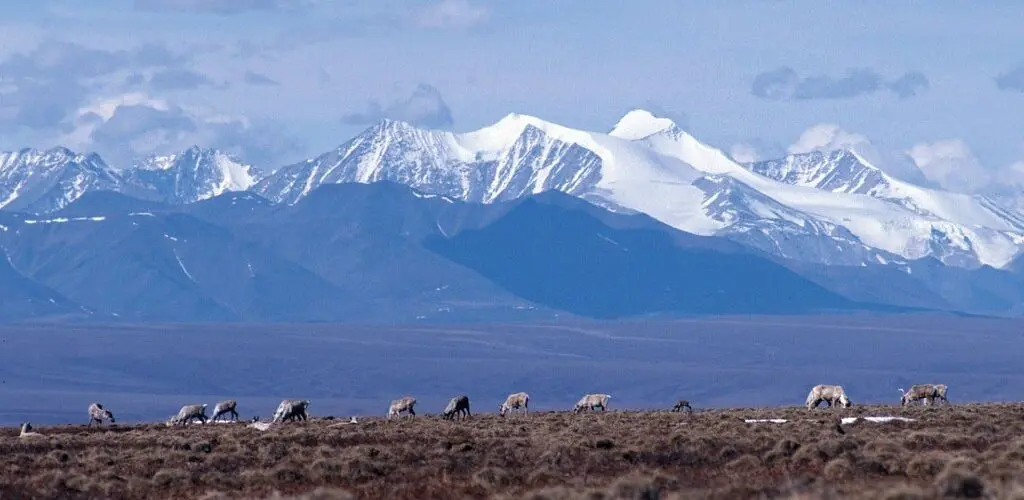Daniel L. Sosland: Arctic Refuge affects people in Connecticut
Acadia Center recently joined more than 240 other organizations in requesting that major insurance companies, including The Hartford and Travelers here in Connecticut, show their solidarity with the Gwich’in Nation, who speak with one voice from Canada to Alaska against oil and gas development in the Arctic National Wildlife Refuge in northeastern Alaska. The coastal plain of the refuge is the birthing and nursing grounds of the Porcupine Caribou Herd and known to the Gwich’in people as Iizhik Gwats’an Gwandaii Goodlit — the Sacred Place Where Life Begins.
The letter asks 10 of the largest insurance companies to commit to the protection of the Arctic Refuge from the harms of fossil fuel development by announcing policies against insuring drilling projects there.
As a Northeast-based organization with deep Connecticut roots, this may seem like a far step from local concerns, but the issues arising around the protection and sanctity of the Arctic Refuge are ones that should register here. Acadia Center works to advance bold, effective, and equitable clean energy solutions for a livable climate and a stronger, more equitable economy in Connecticut and around the region. Connecticut, often a clean energy leader in the region, is working to build a clean energy system that puts people front and center, shifting conversations to promote equitable and economically beneficial solutions.
What happens in the Arctic impacts us all — even in the Northeast. The Arctic is warming four times faster than the rest of the world. If we allow drilling to happen in the refuge, entire coastal villages will continue to erode into the sea, the melting of permafrost will increasingly make infrastructure insecure or impossible, and food sources will disappear. Already, federal dollars are being spent to relocate villages sliding into the sea.
The sea around our coastline is also rising faster than the global average. Hurricanes are increasing in number and intensity – 2020 saw 30 tropical storms, forcing forecasters to dig deep into the Greek alphabet for names, and we are experiencing more heatwaves. With each passing year, the urgency grows to accelerate progress toward clean energy for people across the Northeast. Yet there is hope and progress. Connecticut is joined by most states in the region with aggressive plans to decrease greenhouse gas emissions and increase energy efficiency. Jobs in renewable energy industries such as wind and solar now outnumber jobs in the fossil fuel industry. This is our economic and environmental future. Producing and burning oil from the Arctic Refuge would accelerate climate change not just for Arctic communities, but for the world. And have little to no impact on energy prices.
Recently, Chubb became the first American insurance company to issue a policy stating that they will not underwrite oil and gas projects in the Arctic Refuge. They join 17 insurers and 29 major financial institutions that have restricted support for oil and gas drilling in the Arctic Refuge. This list includes five of Canada’s largest banks along with America’s six largest: Goldman Sachs, JPMorgan Chase, Citigroup, Morgan Stanley, Bank of America, and Wells Fargo. These financial institutions recognize the risks and the reputational consequences they would face should they support the violation of Indigenous Peoples’ human rights and such an important ecosystem.
Acadia Center is proud to have a presence in Connecticut’s vibrant community, and we all want to be proud of our large companies and employers. In solidarity with the Gwich’in Nation, we respectfully urge two of the most important businesses in the state, The Hartford and Travelers, to join colleagues and competitors, and other financial institutions that have taken a stand against financing or insuring oil and gas development in the Arctic National Wildlife Refuge. The human rights of Alaska Indigenous communities, the ecological value of the refuge, and the need to do all we can to avoid the devastating climate impacts are compelling reasons to phase out our addiction to oil and gas. Current and future generations depend on all of us making forward-thinking commitments to human rights and the health of our planet.
Op-ed originally featured in the Hartford Courant. Click here to read it there.



















